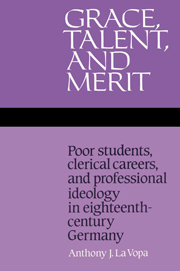 Grace, Talent, and Merit
Grace, Talent, and Merit Summary
Poor students make frequent appearances in the historical record as objects of perception, but their lived experience is more elusive. In prescribing the conditions for their acceptance into educated society, prevailing stereotypes caricatured some of their motives and responses and ignored others. We are left wondering how the initiation actually formed boys and young men, and how they in turn made sense of and came to terms with its imperatives.
To an extent the initiated can speak for themselves about the expectations with which they entered academic studies, about the cultural legacy they brought from their homes to the school, about the dilemmas of poverty and dependence. There is no better entrée to the daily anxieties of the charity pupil than the reluctant request for money Johann Gottlieb Fichte sent his father, a village ribbon weaver, from the Fürstenschule at Pforta on April 1, 1775. Having proudly reported that he expected to receive one of the best grades in the annual examination, Fichte went on to explain in panic that his triumph would bring with it “the fatal custom” of having to treat eleven schoolmates to pastries. But this is a virtually unique glimpse into school life from the pupil's standpoint, and even letters from the university years are rare.
Autobiographical witness is less immediate, more oblique. In one way or another, past experience has been filtered, patterned, and interpreted in the process of memory. Though often acutely conscious of their struggle upward from obscurity, the witnesses did not approach their life histories as case studies of the socialization and acculturation of the upwardly mobile.
- Type
- Chapter
- Information
- Grace, Talent, and MeritPoor Students, Clerical Careers, and Professional Ideology in Eighteenth-Century Germany, pp. 58 - 82Publisher: Cambridge University PressPrint publication year: 1988
